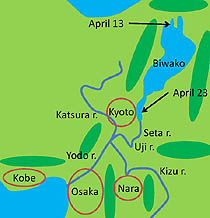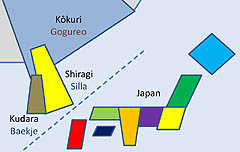
I went to the Seta River to fish for the black bass and got the biggest one I had ever had. The Seta River flows out of the south end of Biwako, the Lake of Lute. Soon, it changes the name into the Uji River, penetrating an old town Uji which is famous for beautiful temples. Then it meets with the Kizu River from Nara and the Katsura River from Kyoto, changing the name into the Yodo River. After supplying the water to the Osaka Plain, it flows into Osaka Bay.
Beside Biwako there was a capital of Japan from 667 to 672 C.E. In 660, Kudara (Baekje in Korean), a kingdom in south Korea which was allied with Japan, was ruined by the united force of Tang in China and Shiragi (Silla in Korean) in Korea. The Japanese government was worried about the invasion of the enemies, and transferred the capital from Asuka near Nara to Ôtsu near Biwako. In those days, the foundations of the centralized nation were built up.

After Kudara had fallen, many exiles came to Japan with the high culture of the continent, for example, philosophy like Confucianism and Buddhism, or technique like architecture and medicine. They were naturalized into Japan and helped the Japanese to construct the new concept of the nation. Their greatest contribution was the Constitution and the law. In 701 C.E., Taihô Ritsuryô, the first Constitution was promulgated, and in 757, it was revised into Yôrô Ritsuryô, which was effective until 1890 when the modern constitution was enacted. Japan has been a law-governed country for more than a thousand years.
I suspect that the Kudara people spoke the same, or, at least, similar, language to the Japanese. As I wrote in “At an Ancient Village” on March 30, 2009, the ancestors of the Japanese are thought to come from south China through south Korea. Kudara must have been the same tribe as Japan. Though this is my speculation, we have some archeological evidence like the common earthenware.

Anyway, the ancient capital near Biwako, sometimes called Ôtsu, sometimes Shiga, was the first place where united Japan was established. Now, there are no traces of the capital there. Even in twelfth century, nothing seemed to be found: In Heike Monogatari, “The Story of Heike”, Tadanori, the Duke of Satsuma, a general of the defeated, sang a song:
The ancient capital
of Shiga
has ruined.
Cherry blossoms of the mountains
bloom as those old days.
sazanami ya
shiga no miyako wa
arenishi wo
mukashi nagara no
yamazakura kana

